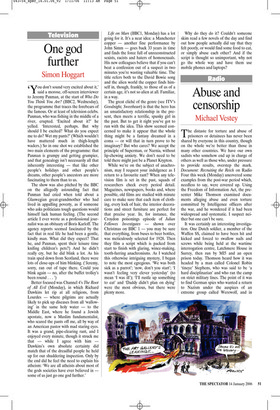Television
One god further
Simon Hoggart
‘ you don’t sound very excited about it,’ i said a morose, off-screen interviewer to Jeremy Paxman, at the start of Who Do You Think You Are? (BBC2, Wednesday), the programme that traces the forebears of the famous. Or at least of television celebs. Paxman, who was fishing in the middle of a river, erupted. ‘Excited about it?’ he yelled. ‘Interested, perhaps. But why should I be excited? What do you expect me to do? Wet my pants?’ (Which wouldn’t have mattered much in thigh-length waders.) So in one shot we established the two main elements of the programme: that Paxman is grumpy and getting grumpier, and that genealogy isn’t necessarily all that inherently interesting — that like other people’s holidays and other people’s dreams, other people’s ancestors are more fascinating to them than to us.
The show was also pitched by the BBC on the allegedly astounding fact that Paxman had cried when told about a Glaswegian great-grandmother who had lived in appalling poverty, as if someone who asks politicians tough questions would himself lack human feeling. (The second article I ever wrote as a professional journalist was an obituary of Boris Karloff. The agency reports seemed fascinated by the fact that in real life he had been a gentle, kindly man. What did they expect? That he, and Paxman, spent their leisure time knifing children’s pets?) And he didn’t really cry, but he did blink a lot. As his train sped down from Scotland, there were lots of close-ups of him blinking. (‘Jeremy, sorry, ran out of tape there. Could you blink again — no, after the buffet trolley’s been round ... ’) Better focused was Channel 4’s The Root of All Evil (Monday), in which Richard Dawkins let rip at all religions, from Lourdes — where pilgrims are actually likely to pick up diseases from all ‘wallowing’ in the same holy water — to the Middle East, where he found a Jewish apostate, now a Muslim fundamentalist, who scared the pants off me, all by way of an American pastor with mad staring eyes. It was a grand, pipe-clearing rant, and I enjoyed every minute, though it struck me that — while I agree with him — Dawkins’s own absolute certainty did match that of the dreadful people he held up for our shuddering inspection. Only by the end did he feel the need to explain his atheism: ‘We are all atheists about most of the gods societies have ever believed in some of us just go one god further.’ Life on Mars (BBC1, Monday) has a lot going for it. It’s a neat idea: a Manchester copper — another fine performance by John Simm — goes back 33 years in time and finds the force full of unreconstructed sexists, racists and haters of homosexuals. His new colleagues believe that if you can’t beat a confession out of a suspect in two minutes you’re wasting valuable time. The title refers both to the David Bowie song and the alien world the copper finds himself in, though, frankly, to those of us of a certain age, it’s not so alien at all. Familiar, in a way.
The great cliché of the genre (see ITV’s Goodnight, Sweetheart) is that the hero has an unsatisfactory relationship in the present, then meets a terrific, spunky girl in the past. But to get it right you’ve got to run with the idea. This show seemed concerned to make it appear that the whole thing might be a fantasy dreamed in a coma — or will that in turn prove to be imaginary? But who cares? We accept the principle of Superman, or Narnia, without lip-chewing anxiety. We don’t need to be told there might just be a Planet Krypton.
While we’re on the subject of anachronism, may I request your indulgence as I return to a favourite rant? When any television film is set in the past, squads of researchers check every period detail. Magazines, newspapers, books and, where possible, old films are studied with minute care to make sure that each item of clothing, every lock of hair, the interior decorations and street furniture are perfect for that precise year. In, for instance, the Croydon poisonings episode of Julian Fellowes Investigates — shown over Christmas on BBC 1 — you may be sure that everything, from buses to beer bottles, was meticulously selected for 1928. Then they film a script which is packed from start to finish with glaring, wince-making, tooth-furring anachronisms. As I watched this otherwise intriguing mystery, I began to note the most egregious. ‘We was both sick as a parrot’; ‘now, don’t you start’; ‘I wasn’t feeling very clever yesterday’ (to mean ‘I was ill’); ‘I’ll rustle up something to eat’ and ‘Daddy didn’t plan on dying’ were the most obvious, but there were plenty more. Why do they do it? Couldn’t someone skim read a few novels of the day and find out how people actually did say that they felt poorly, or would find some food to eat, or simply abuse each other? And if the script is thought so unimportant, why not go the whole way and have them use mobile phones and laptops?














































 Previous page
Previous page